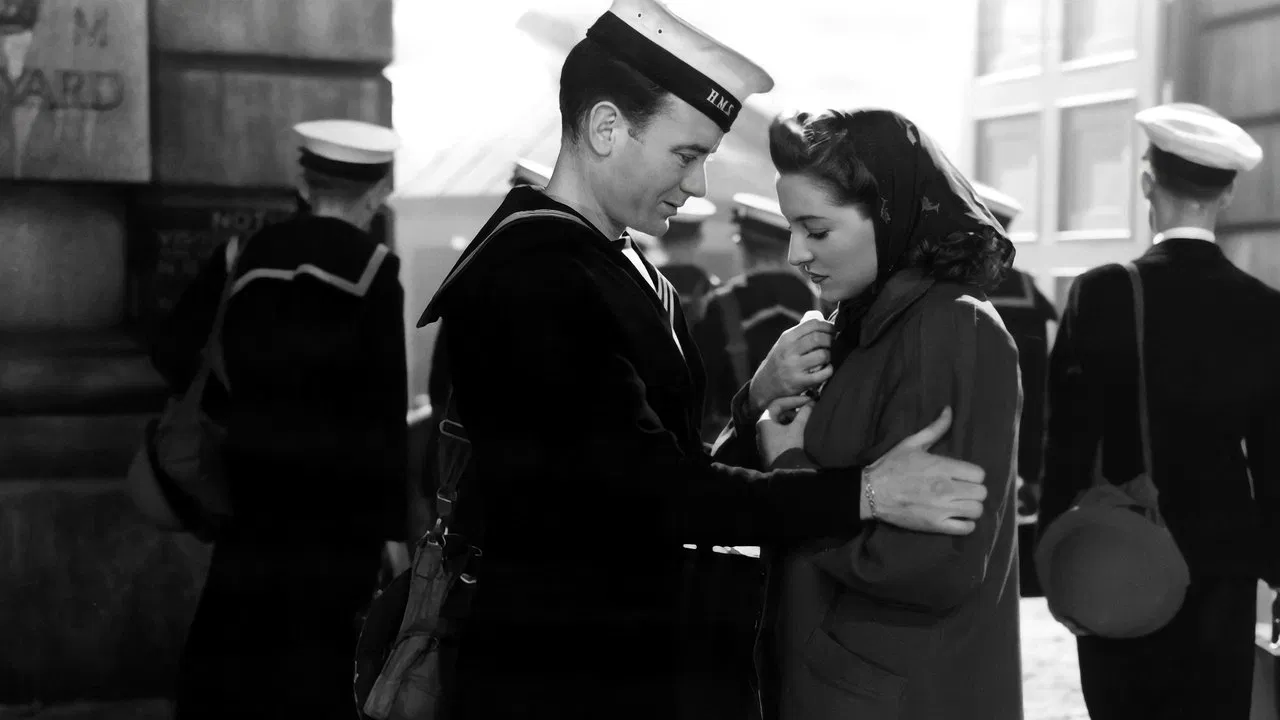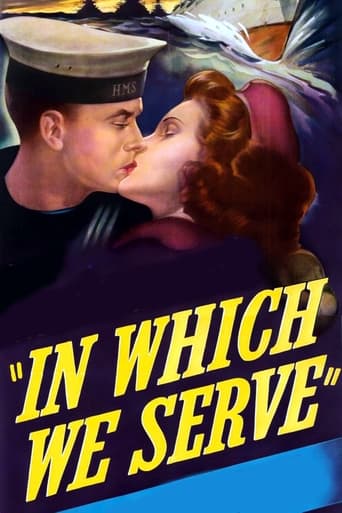

First time watching In Which We Serve, it struck me as a very good film, though with some draggy moments in the first half, some of the clipped dialogue seeming stilted and Noël Coward seemed a little stiff at first. Re-watching again as part of a David Lean marathon, In Which We Serve held up much better on re-watch.It does drag still a tad in the first half-hour or so, but the initial problems had with some of the dialogue and Coward at first weren't apparent this time. The script- courtesy of Coward- this time around was very nuanced and stirring, the speeches could easily have been too preachy, and instead what the film has to say is told in an intelligent, poignant and sometimes uplifting way. Coward's initial stiffness struck me on re-watch as something that suited the character, who was written as quite dour at first anyway, and it is a very authoritative, caring and moving lead performance on the whole, his HMS Torin speech is a classic and if the lower lip doesn't tremble (or more) during his incredibly emotional farewell I'm not sure what will.Coward is wonderfully supported by the rest of the cast, especially from the shimmering film debut of Celia Johnson, a sympathetic Bernard Miles and John Mills in one of his better Lean film performances. Richard Attenborough (who never looked so young than in this film) also makes his screen debut, and a memorably powerful one it is too. The story is riveting, often thoroughly entertaining and immensely moving, notably Coward's farewell and the men from Dunkirk being unloaded at portside. Who can't help love the values that it shows too? Coward was aiming to inspire, and he definitely succeeds. His co-direction with Lean works just fine, with his more nuanced style contrasting well with Lean's more vivid action style.In Which We Serve is beautifully filmed in sumptuous black and white, the Royal Navy details and settings being more than convincing, and Coward also provides a stirring and hauntingly beautiful music score. Overall, a great and very moving film and much more than just wartime propaganda (a distinction more suited to something like Dangerous Moonlight). 9/10 Bethany Cox
... View MoreThis film; made at the height of the war follows the crew of Royal Navy destroyer HMS Torrin from its commissioning to her sinking in the Eastern Mediterranean. We know her fate from the start as the story is told in flashback as her crew cling to life-rafts waiting rescue. The story concentrates on three main characters; Captain Kinross, Ordinary Seaman 'Shorty' Blake and his uncle in law Chief Petty Officer Hardy; we also see how their families cope while they are away. During their time at sea they experience both success and tragedy; we see the crew being brave under fire but we are also shown one man who cracks under the pressure; we also see that the horrors of war also directly affected the people back home.As this was made in 1942 when the war was far from won one might expect a blatant propaganda piece showing 'our brave boys' battling heroically against a dastardly foe rather than a surprisingly realistic depiction of war where the protagonists are shown in a moment of defeat and loved ones back home are in danger too... of course people watching this at the time wouldn't have believed it if it as they were living through the war and knew it didn't always go well. Noel Coward wrote a fine story and also did well as Capt. Kinross; not his typical role but one he was believable in; other notable performances came from Celia Johnson as his wife, John Mills as 'Shorty' Blake, Bernard Miles as CPO Hardy and an uncredited Richard Attenborough as the young sailor who left his post in a panic. The action scenes are well handled and very believable; there are also plenty of tense moments such as when the survivors get strafed by enemy aircraft while clinging to their raft and the scene were Shorty's wife and Hardy's wife and mother listen to the bombs getting closer during an air raid over Plymouth. It is no surprise that many of those involved in this film went on to become well known film stars and in the case of David Lean a famous director.
... View MoreThe purpose of this movie from 1942 was to raise the morale on the British home front during World War II and it achieves this objective in a superb piece of film-making that drew on the virtues that made Britain one of the toughest and most courageous countries in history. Loyalty, devotion to duty, the stiff upper lip in the face of tragedy, deference to authority, and the obligation of those in authority to their subordinates were considered the foundation of a stable country. In a series of flashbacks after a British naval ship is attacked, the movie reinforces the importance of these virtues and of each man and woman to the war effort.David Lean made his directorial debut under the guidance of Noel Coward, one of the deans of British stage and screen. The movie presents a number of young actors who went on to notable acting careers: John Mills, Bernard Miles, Richard Attenborough. Coward was the ship's captain and carries out his role, not only with the obligatory noblesse oblige, but with genuine affection for the men he leads. Celia Johnson, his wife, also rises to the occasion and in one memorable speech to a group of guests, makes known that she must share her husband's love with the ship he commands. Of course, she went on to several major roles, including Brief Encounter, another quintessential British movie in 1946. This movie is a textbook example of how the British expected their people to carry out their duty in the face of adversity. It is a pleasure to watch with its excellent dialogue and acting. It is definitely not the movie one would expect to be made in 2011 but it has style and grace, elements sadly lacking in many of today's movies.
... View MoreDirected by David Lean (The Bride on the River Kwai) and Noel Coward (also starring), both making their directorial debuts, this is quite a good British war film. It is a film that combines war ship battles and character flashbacks. Basically the British destroyer ship, HMS Torrin is attacked by the Nazis, and is sinking slowly, and as the surviving members of the British ship cling to a life raft, they have flashbacks both of the (familiy) live they have left behind, and their work in the army and on the ship before the attack. Starring Coward as Capt. Edward V. Kinross, Sir John Mills as Ordinary Seaman Shorty Blake, The Man Who Knew Too Much's Bernard Miles as CPO Walter Hardy, Brief Encounter's Celia Johnson as Alix Kinross, Kay Walsh as Freda Lewis, Joyce Carey as Katherine Lemmon Hardy; Derek Elphinstone as First Lieutenant, the 'Torrin' (Number One); Michael Wilding as 'Flags', Second Lieutenant; Robert Sansom as 'Guns', Gunnery Officer; Philip Friend as 'Torps', Torpedo Officer, Ballard Berkeley as Engineer Commander, James Donald as Ship's doctor, Michael Whittaker as Sub and Lord Sir Richard Attenborough (in his film debut) as Snotty, Midshipman Who Leaves Post. It was nominated the Oscars for Best Picture and Best Writing, Original Screenplay, with a special Honorary Award for Coward. Sir John Mills was number 38 on The 50 Greatest British Actors, and the film was number 57 on The 100 Greatest War Films. Very good!
... View More